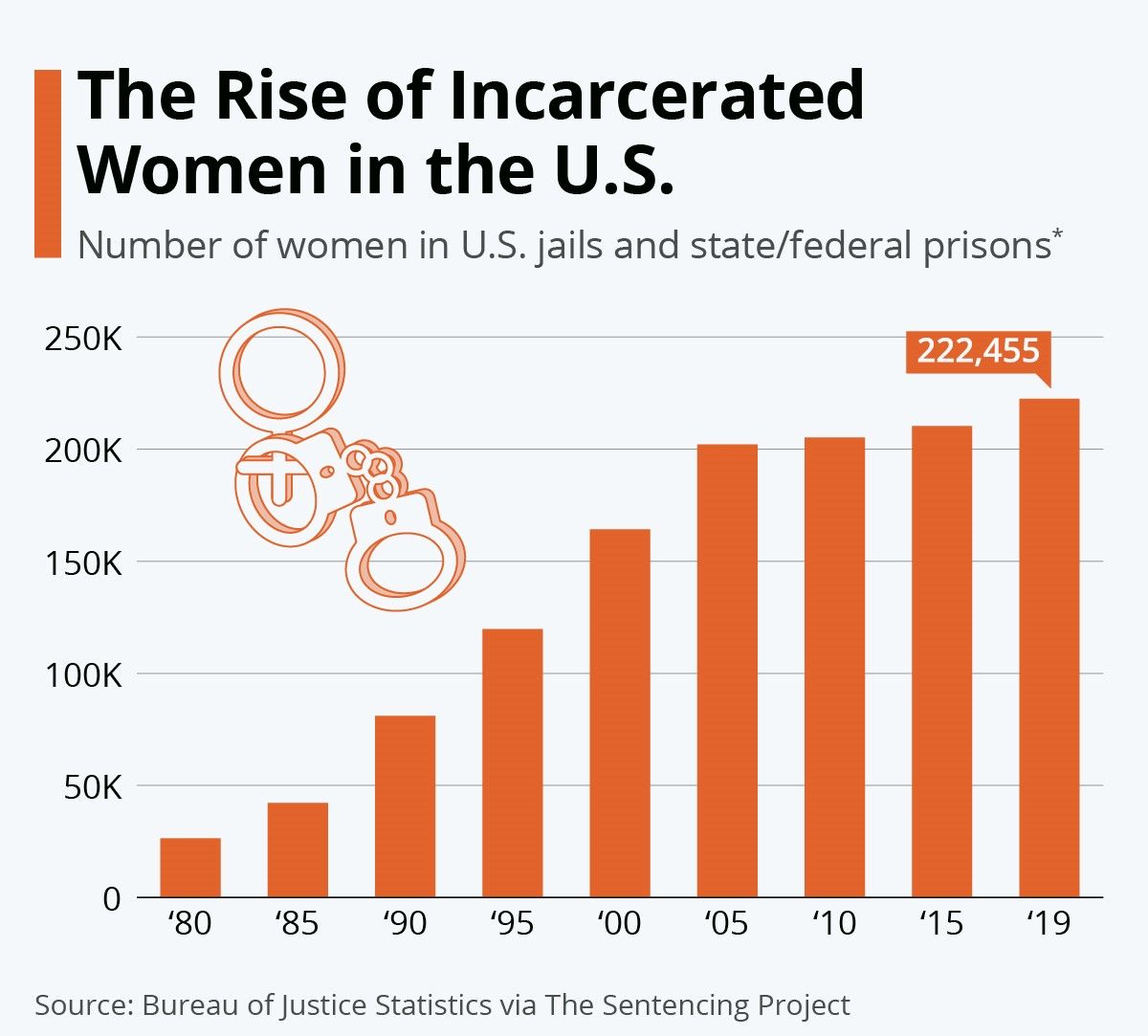Opinion - Incarcerated Women Are Dehumanized and Overlooked
Number of women incarcerated in the U.S. rose by 700 percent over past 40 years

Women’s incarceration has grown at twice the pace of men’s incarceration in recent decades, and has disproportionately been located in local jails. A staggering number of women who are incarcerated are not even convicted: more than a quarter of women who are behind bars have not yet had a trial. Moreover, 60% of women in jails under local control have not been convicted of a crime and are awaiting trial.
One of the reasons cited for such a major increase can be traced back to the draconian policies brought in under The War on Drugs campaign in the 1970s. This is reflected in the numbers, with more than 61 percent of women incarcerated in federal prison for nonviolent drug crimes, according to the Drug Policy Alliance (DPA). Under the new rules, women could be jailed for ‘conspiracy’ with drug networks for simply living with a partner or family member involved in drug sales, while mothers who tested positive for any drug could face imprisonment for child abuse.
Although the data does not yet exist to break down the “whole pie” by race or ethnicity, we know that Black and American Indian or Alaska Native women are consistently overrepresented in state and federal prisons: Women in prison are 48% white, 17% Black, 19% Hispanic, 2.5% American Indian or Alaska Native, 0.7% Asian, and 13% “other.” While we are a long way from having data on intersectional impacts of sexuality and race or ethnicity on women’s likelihood of incarceration, it is clear that Black and lesbian or bisexual women and girls are disproportionately subject to incarceration.
The following opinion appeared today in Teen Vogue. Written by Bahar Mirhosseni, Chelsea Halstead, and Sandra Babcock, "Incarcerated Women Are Dehumanized and Overlooked, Cornell Center on the Death Penalty Says," makes the case that women are the new face of incarceration, criminalization, and punishment in the United States.
Excerpts are featured below.
*****
There’s a gendered crisis underway that isn’t getting nearly enough attention. Although the majority of people locked up around the world are men, since 2000, women’s global incarceration has skyrocketed nearly 60%, according to the Institute for Crime & Justice Policy Research. In the United States, since the 1980s, the number of women in prisons and jails has increased sixfold. The US cages more women than anywhere else on earth, with just 4% of women’s total global population but 30% of the world’s incarcerated women, per the Prison Policy Initiative.
Women's experiences, however, are often overlooked and disregarded. In the words of our client Kwaneta Harris, who was held in solitary confinement for eight years in Texas: "By design, our daily lives in this women’s solitary facility are hidden from the public. There are details about our lives in ‘the hole’ that only folks currently living it can credibly describe. Society would be appalled, but we’re never invited to participate in discussions concerning us." This is an alarm bell for a new era: Women are the new face of criminalization, incarceration, and punishment.
Gender, racial, and poverty-based biases are not inevitable. They are the product of systemic injustices in legal and political institutions. The cash bail system, for example, is wealth-based discrimination that harms poor people in a multitude of ways. To mention poverty-based detention, we must add that poverty itself is racialized and gendered. Women in the US are subjected to higher rates of poverty than men and it is well-documented that women of color – especially Native American, Black, and Latina women – are subjected to the highest rates of poverty. One night in jail can produce dozens of life-altering consequences that devastate the lives of women and children. This is especially true in a patriarchal society that expects women — and in particular poor women of color — to perform caretaking roles without access to the resources they need to raise families, and yet is remarkably punitive when mothers are deemed not to have performed their roles well enough.
While most women who are sentenced to prison have been subjected to gender-based violence, as also established by the National Black Women's Justice Institute, the impact of such violence is often not explored as a driving force in bringing women into contact with the criminal legal system. In these cases, we need to recognize our collective ignorance of the forms of oppression and violence that shape the day-to-day lives and decisions of many women. Shifting our lens and broadening our cultural awareness, particularly in the criminal defense space, is one step forward to a gender-justice reckoning in the United States.
*****
Read the full opinion "Incarcerated Women Are Dehumanized and Overlooked, Cornell Center on the Death Penalty Says" at the Teen Vogue website. Bahar Mirhosseni Bahar Mirhosseni is a Lecturer at UCLA School of Law and teaches Law 835, Pay or Stay: An Exploration of the Bail System in America. Chelsea Halstead is the Director of the Cornell Center on the Death Penalty Worldwide, where she oversees the center’s strategy, advocacy, and fundraising efforts. Sandra Babcock is a professor of clinical law at Cornell Law School.










